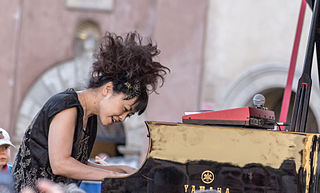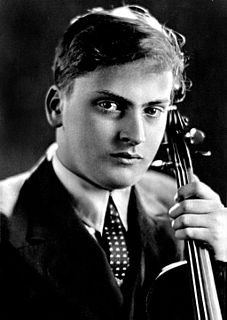A Quote by Andre Gide
Mozart's joy is made of serenity, and a phrase of his music is like a calm thought; his simplicity is merely purity. It is a crystalline thing in which all the emotions play a role, but as if already celestially transposed. Moderation consists in feeling emotions as the angels do.
Related Quotes
Mozart in his music was probably the most reasonable of the world's great composers. It is the happy balance between flight and control, between sensibility and self-discipline, simplicity and sophistication of style that is his particular province... Mozart tapped once again the source from which all music flows, expressing himself with a spontaneity and refinement and breath-taking rightness that has never since been duplicated.
Positive emotion can be about the past, the present, or the future. The positive emotions about the future include optimism, hope, faith, and trust. Those about the present include joy, ecstasy, calm, zest, ebullience, pleasure, and (most importantly) flow; these emotions are what most people usually mean when they casually-but much too narrowly-talk about "happiness." The positive emotions about the past include satisfaction, contentment, fulfillment, pride, and serenity.
For war to man, like childbirth to women, is simplifying in its emotions and activities. All the real problems of life can be put aside while the one thing is done and little thought is needed to do it. ... His hatreds can be expressed without censure, he can let his emotions run free, he can behave as dramatically, as heroically as he likes, and no one laughs at him. It is almost impossible for a man to behave heroically in the cool and ordinary times of peace. But in war anything is allowed him, he is praised and applauded and made much of, as women are excused and allowed for in pregnancy.
One cultivates spaciousness or awareness which allows you to acknowledge the emotions and see them as part of the human condition. Emotions are like subtle thought forms and they all arise in response to something outside yourself. They are all reactions. You cultivate a quietness in yourself that watches these emotions rising and falling and passing away.
It is the consciousness of the threefold joy of the Lord, His joy in ransoming us, His joy in dwelling within us as our Saviour and Power for fruitbearing and His joy in possessing us, as His Bride and His delight; it is the consciousness of this joy which is our real strength. Our joy in Him may be a fluctuating thing: His joy in us knows no change.
Men will imitate and admire his unmoved firmness, his inflexible conscience for the right; and yet his gentleness, as tender as a woman's, his moderation of spirit, which not all the heat of party could inflame, nor all the jars and disturbances of this country shake out of its place: I swear you to an emulation of his justice, his moderation, and his mercy.
Often, I could not find the range of emotions in classical music which I found in the The Rolling Stones and Hendrix. Listening to Bach, I found a deep spirituality and felt elevated above the human level. Yet the feeling and emotions attached to popular music speak to us far more personally, and I couldn't leave that behind.






































